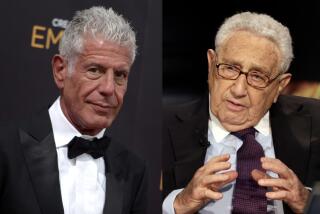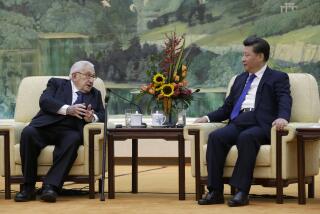Dalai Lama Should Hire Kissinger
- Share via
The U.S. government’s pursuit of international human rights has long borne the marks of an impotent philanderer: muddled, incompetent and ultimately unsatisfying to all parties concerned. But the visit of Chinese President Jiang Zemin provides the further humiliation of placing those pathetic and fumbling efforts in the spotlight of full public view.
Here’s Clinton on Tibet: “We continue to speak . . . on behalf of the people and the distinct culture and unique identity of the people of Tibet, not their political independence, but their uniqueness.” Clinton, having learned much from the historic treatment of Native Americans, will evidently go to the wall for the right of indigenous people to sell their beads. Perhaps the Tibetans could be encouraged to live on reservations if they, too, were guaranteed casino gambling rights?
Henry Kissinger is just the man to put the deal together now that Disney has hired him to smooth things over with the Chinese, who are irritated by a Disney movie casting the occupation of Tibet in a negative light. However, it is not clear that Kissinger could find Tibet on the map, since there is no reference to Tibet or the Dalai Lama in the index of the former secretary of State’s 3,716 pages of his three memoirs crowing over the diplomatic successes of the Nixon years. Chief among those was the Shanghai Communique, which solidly committed the U.S. to a one-China policy that endorsed Beijing’s claims to Taiwan, Hong Kong and, as an unspoken afterthought, Tibet.
“Mr. Eisner,” one can almost hear Kissinger hectoring the head of the Disney company, “Tibet is a movie; it is not a country. As secretary of State it was my responsibility to preclude Tibet from becoming an irritant. But now, as your consultant, I’ll see what I can do to sweeten the back end of the deal.”
Kissinger has a lot of clout with the Chinese Communists, not only because he once tailored the Cold War to suit their needs but because, since his retirement from public life, he has been the front man for top U.S. companies seeking to do business with them on a most-favored-nation basis.
Who else can so authoritatively argue that it makes perfect sense for Westinghouse and General Electric to sell advanced nuclear technology to Red China but it’s still a felony for an American to purchase Cuban cigars? What threat does trade with Cuba really represent other than to the Democrats’ chances of winning Florida? China, according to the most recent CIA analysis, is “the most significant supplier of weapons of mass destruction, related goods and technology” in the world.
Kissinger may no longer be indispensable to the defense of U.S. hypocrisy. Madeline Albright is a worthy successor, as demonstrated last week when she condemned legislation that would sanction countries that suppress religious freedom. Such a standard, Albright warned, would “deprive U.S. officials of the flexibility required to protect the overall foreign policy interests of the United States.”
Without “flexibility” a secretary of State would be at pains to explain why we have stark sanctions against Cuba, which has sufficiently improved the status of the Catholic Church to merit a visit from the pope, while we cozy up to China, which still jails its Catholics.
Albright went on to make an inspired plea for tolerance of intolerance when she said, “It is in our interest for America to promote religious freedom and human rights. But if we are to be effective in defending the values we cherish, we must also take into account the perspectives and values of others.”
I can’t prove it, but I think Albright’s speech writer moonlights for Jiang, who said, “I hope Americans will understand that American democracy and freedom are not absolute concepts.”
Why should Jiang think differently? Ever since Kissinger and Nixon drank mao-tais with Chairman Mao, the U.S. government has given the Chinese a broad conniving wink of approval whenever the subject of human rights came up. The Chinese people were significant only as pawns in our global power games and as an immense market to be plundered.
Why should this trip be different? U.S. corporations now have more than $15 billion invested in China, and they and their huge army of lobbyists and consultants, led by the likes of Kissinger, call the shots. But if the Dalai Lama could buy a few dozen planes from Boeing, it could be a different story.
More to Read
Sign up for Essential California
The most important California stories and recommendations in your inbox every morning.
You may occasionally receive promotional content from the Los Angeles Times.













